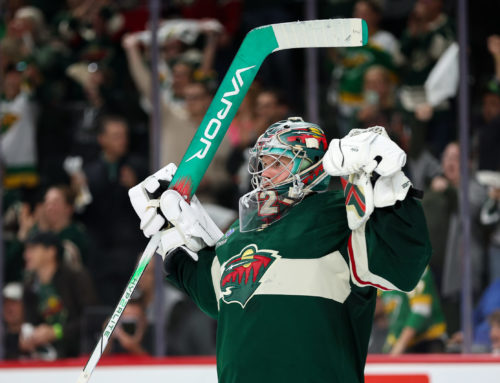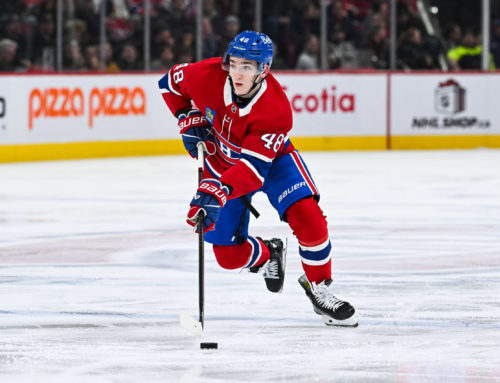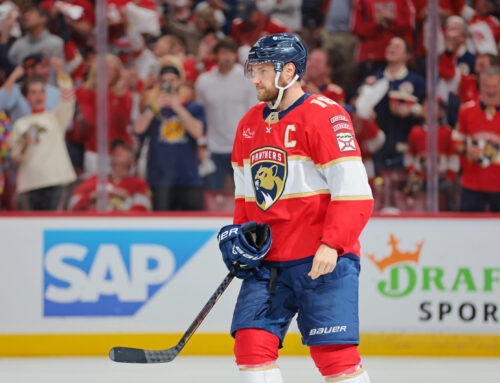
The Detroit Red Wings avoided an arbitrator’s ruling with winger Tomas Tatar by signing him to a four-year deal carrying an average annual value of $5.3 million. That is the same AAV as the recently-signed Ondrej Palat from Tampa Bay.
Tatar had 25 goals and 46 points for the Wings in 2016-17.
While those 25 goals don’t seem like a huge total, he did manage 19 of them at five-on-five. That was the same number that Brad Marchand and Viktor Arvidsson tallied. It was the result of a percentage binge, however, as it was the third straight year of shot-per-minute decline he endured.
Cap leaguers will have a decision to make. It’s hard to see this Detroit team being much higher scoring in the near-term than they were last year, which means there probably isn’t much improvement from Tatar ahead production-wise. He can be a 25-goal, 25-assist type of player but with the talent on that team lacking, particularly on the blue line, expecting much more than that isn’t realistic. He’s probably fine if it’s a points-only cap league, but roto league owners may want to find a trading partner.
****
Throughout the summer, I’m going team by team to discuss various fantasy performances from relevant players, and what it could mean for 2017-18. Next on the list is the Philadelphia Flyers.
It was the Philadelphia captain’s third straight season with a declining points-per-game mark. It was also his third consecutive season coming in under a point-per-game after three seasons from 2011-2014 all averaging at least a point per game. He managed his lowest goal total (14) in an 82-game season since 2008-09, his lowest assist total (44) since 2009-10, and lowest shot total (199) since 2010-11.
Things are not going great.
It’s really been a weird career arc for Giroux. Through his first four full seasons, he shot at least 11 percent in each of them, and averaged 12.5 percent; since then he’s shot under 10 percent in four of five seasons, averaging 9.5 percent. Shooting percentages typically do decline as a player ages, but to fall so far, so consistently in mid-to-late twenties seems odd. His shot map shows us clearly why, however. Below are maps at both five-on-five and five-on-four, the first set from 2010-11 when he shot a career-best 14.8 percent, and last year when he shot a career-worst 7 percent, from Hockey Viz:




He started to shoot from the outside at five-on-five, something that has been going on for years now. There’s a reason he’s 87th out of 95 forwards in five-on-five shooting percentage over the last three years, and it’s not purely bad luck.
It’s hard to argue with Philadelphia’s power-play setup, as they’re third in goals per minute at five-on-four over the last three years, even though their shot rate is considerably higher than their shooting percentage. He should keep racking up those PP assists – he had 26 last year which was second in the league among forwards – but for leagues that separate PP goals and assists, it’s important to understand unless he runs into a shooting percentage binge, with this current setup, his days of threatening for double-digit PP goals are gone.
Combined with a decline in ice time (Giroux managed under 20 minutes a game, 19:07 to be exact, for the first time in six years), it’s hard to imagine much of a bounce-back coming. Keep in mind, that was without Sean Couturier for about 20 percent of the season. The power play will keep his total numbers afloat, and that’ll give him value. With his approach to shooting these days, however, it’s hard to rely on much more than 65 point at this point of his career, rather than hoping for a surge towards 80.
****
Be sure to check out the Dobber shop and grab your copy of the Fantasy Guide which is set to release on August 1st!
****
On the bright side of things, Voracek’s ice time hit a career-high on a per-game basis. On the not-so-bright side of things, he managed a five-year low in points per game at 0.74.
Two years ago, Voracek scored 11 power-play goals. In the two years since, he has six. Total. And yes, things have changed with regards to his shot location:


Like Giroux, there’s a reason Voracek is shooting 3.57 percent on the power play over the last two years, a mark that would rank him in the bottom-half of defencemen at five-on-five over those two years. It’s because he’s shooting from no-man’s land. When you’re shooting from outside the face-off dot, from the top of the circle, you’re not going to score with frequency with reliability. You’re simply too far away at too poor an angle. It requires a perfect pass, a perfect shot, and the hope the goalie doesn’t make his way over. For that reason, unless their setup changes, he’s not going to rebound much from where he was in 2016-17.
It’s not to say he had a bad fantasy season – he managed over 250 shots on goal, over 60 points, 20 goals, over 20 power-play points, and even managed a healthy amount of penalty minutes. Following a three-year stretch, however, that saw him put up 0.89 points per game, I think fantasy owners were hoping he’d be a consistently elite fantasy winger, and he just can’t be. Of course, guys go on shooting binges all the time that can inflate a single-season performance (like Evander Kane), but relying on that is not recommended.
Again, like Giroux, the effectiveness of the Philadelphia power play will mean his production can stay stable so long as that man advantage unit does. Expecting any sort of return to 70-plus point seasons for Voracek isn’t likely to happen, however, and fantasy owners need to adjust accordingly.
The 2016-17 season was the fifth straight 82-game season in which Simmonds managed double-digit power-play goals, finishing with 16. It was his second 30-goal season in a row, and fourth straight with at least 28. It was also his third season since the lockout year with both at least 100 power-play minutes, and 200 shots on goal. Quite simply, Simmonds has cemented himself as among the upper-echelon roto fantasy performers.
What is concerning is the lack of five-on-five scoring. As with the two teammates mentioned above, so long as the Flyers power play keeps humming along, his production should be fine. However, for the first time since his rookie season in 2008-09, Simmonds’ team scored fewer than two goals per 60 minutes with him on the ice. That led to a career-low in five-on-five assists per minute, and his lowest points per minute mark since his rookie year. That should hopefully rebound next year.
Something has to change next year as his most-common line mate at five-on-five was Brayden Schenn, who is now in St. Louis. Some consistency in his line mates would probably be a good idea; Schenn was his most-common line mate, and he didn’t even spend half his five-on-five time with him. In fact, out of over 1050 minutes on the ice, Giroux is the only remaining Flyer with whom Simmonds spent at least 300 minutes.
Other than the team’s goal scoring, there wasn’t much change in Simmonds’ shot rates or scoring rates at five-on-five from the previous three seasons. A rebound by team scoring here could mean the talented power forward cracking the 60-point mark again, and once again being a very valuable roto asset. He won’t come at a discount at the draft table, though. He is going to be no lower than a third-round pick in 12-team leagues, and wouldn’t be surprised to see him sneak into the top-25. As long as the power play remains as potent as ever, he’s a pretty safe pick at that point.
Travis Konecny
All told, it was a fine rookie campaign for the then-19-year old. He finished second on the team in points per 60 minutes at five-on-five (excluding Valtteri Filppula), and first in shots per 60 minutes. Like most non-elite rookies, he was moved up and down, and in and out, of the lineup, but managed 28 points in 70 games playing largely third-line minutes. A very stellar effort.
To be a bit nitpicky, he could probably start getting close to the net for his five-on-five shots:

That is really picking nits, however, as a teenage rookie can’t necessarily be expected to play like Wayne Simmonds. Comfort should come with age, and he’s definitely a player known for playing with a bit of an edge. I would except his shot locations to improve moving forward.
The overarching theme for Philadelphia’s fantasy performers is the top power-play unit. Those on the outside looking in don’t have much of a chance of being significant contributors. With Schenn leaving, it does leave a hole on that top quintet, but I’m not sure if Konecny fills it. Schenn typically played in the middle of the PP, in a one-time position for passes from Giroux. With Konecny being a right-handed shot, it would not put him in the same position.
Konecny probably settles into a middle-six role for the Flyers, which should mean a bit of additional ice time (along with simply dressing every game). Without those prime PP minutes, however, the full-fledged breakout will have to wait. If he can get in the 40-point range, that should be considered a successful season.
Ivan Provorov
Having already written about Shayne Gostisbehere this summer, I thought it best to give Provorov a bit of virtual ink.
Undoubtedly a cornerstone of the future for the Flyers’ blue line, the 20-year old probably exceeded all expectations. His 30 points was fourth among rookie defencemen, but it’s worth noting he managed those 30 points with just five coming on the power play; Zach Werenski had 21 while Nikita Zaitsev had 12. On a points-per-minute basis at five-on-five, Provorov (0.84) stacked up very well against some big names like Torey Krug and Oscar Klefbom (0.85) and Morgan Rielly (0.81). Given that he did so on a team that scored at a lower rate than Arizona, it’s all the more impressive.
Among defencemen with at least 1000 five-on-five minutes played, Provorov finished in the top 25 percent in shots per minute. He could probably stand to shoot more from a fantasy perspective, but it’s still a very solid mark for a debut season.
Even his shot-driving metrics were very solid when he was paired with notorious boat anchor Andrew MacDonald.
The young Russian did everything that a team could hope to see in a rookie season for a future blue line pillar. Even by the eye test, he was smooth and decisive with the puck. At the risk of hyperbole, it may only be a few years until he’s in the Norris Trophy conversation. Be warned, however, that unless he supplants Ghost on the top PP unit, his upside will be capped on this team. If he can even manage 40 points, that would be a wildly successful fantasy campaign.
One Comment
Leave A Comment
You must be logged in to post a comment.





 EDM
EDM FLA
FLA COL
COL MIN
MIN DAL
DAL ANA
ANA VAN
VAN NSH
NSH CBJ
CBJ

Regarding Giroux, I think it would be relevant to mention that he’s been playing with a bad hip recently and has also suffered several concussions during his career, which are bound to affect some players more than others, not only in medical terms, but in consciously or unconsciously making them play safer than they did before suffering one. Taking 99% of your shots on the powerplay in the exact same spot makes it a lot easier for penalty-killers and goalies to stop him, especially when he doesn’t have a hard shot. Clearly, both Giroux and Voracek need to be able to move around more on the powerplay to make it harder for the PK and goalies to anticipate what they’ll do.
I think Ghost and Provorov may be one of the next duos on D that can both put up impressive totals while playing on the same team. If Provorov does win a Norris in the near future it will be because he’s productive offensively and is sound on defense.I noticed right away that he was seeing top minutes on the Flyers’ top PK unit. Hopefully the Flyers will give Sanheim and Morin the chance to make their way into the lineup full-time and put MacDonald on the bottom-pairing where he belongs.